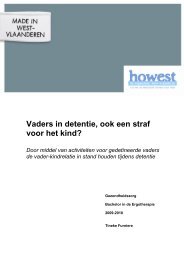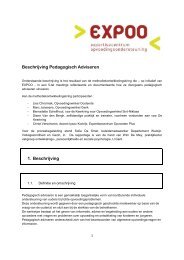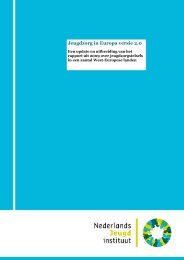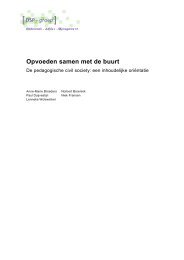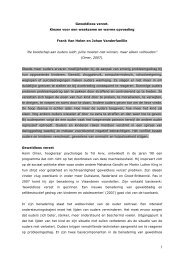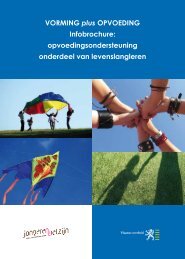Davidson, G. & Campbell, J. (2007). An examination of the use of coercion by assertiveoutreach and community mental health teams in Northern Ireland. <strong>British</strong> Journal ofSocial Work, 37(3), 537–555.Day, C., Michelson, D., Thompson, T., Penney, C. & Draper, D. (in press). The empoweringparents, empowering communities: a pilot evaluation of a peer-led parentingprogramme. Innovation in Practice Paper. London.DePanfilis, D. (2006). Child neglect: A guide for prevention, assessment and intervention. London:Children’s Bureau, Office on Child Abuse and Neglect.Department of Health (2011). No health without mental health: A cross-government mental healthoutcomes strategy for people of all ages. London: HMG/DH.DeVance, A., Taliaferro, J., De-Guir-Gunby, J. & Allen-Eckard, K. (2009). I can see parentsbeing reluctant: perceptions of parental involvement using child and family teams inschools. Child and Family Social Work, 14(3), 278–288.Dumas, J.E., Moreland, A.D., Gitter, A.H., Pearl. A.M. & Nordstrom, A.H. (2008). Engagingparents in preventive parenting groups: Do ethnic, socio-economic, and beliefmatch between parents and group leaders matter? Health Education & Behaviour,35, 619–633.Dunst, C., Trivette C. & Deal A. (1988). Enabling and empowering families: Principles andguidelines for practice. Cambridge, MA: Brookline Books.Dyson, C., Gorin, S., Hooper, C-A. & Cabral, C. (2009). Bangladeshi families living inhardship: findings from research using a life-history approach. Child & Family SocialWork, 14(3), 362–371.Edwards, R.T., Ó Céilleachair, A., Bywater, T., Hughes, D.A. & Hutchings, J. (2007).Parenting programme for parents of children at risk of developing conduct disorder:cost-effective analysis. <strong>British</strong> Medical Journal, DOI:10.1136/bmj.39126.699421.55.Elliott, D. (2010). Lessons from Columbine: effective school-based violence preventionstrategies and programmes. Journal of Children’s Services, 4(4), 53–62.Farrington, D.P. (2008). Entries on Criminal careers, Family factors in offending andJuvenile delinquency. In G. J. Toell, D.P. Farrington, D.A. Crighton & G.V. Hughes(Eds.), Dictionary of forensic psychology. Cullompton, Devon: Willan.Flanagan, S.M. & Hancock, B. (2010). Reaching the ‘hard to reach’: lessons learned. BMCHealth Services Research, 10, 92.Flay, B.R., Biglan, A., Boruch, R.F., Castro, F.G., Gottfredson, D., Kellan, S., Moscicki, E.K.& Schinke, S. (2005). Standards of evidence: Criteria for efficacy, effectiveness anddissemination. Prevention Science, 6(3), 151–175.Ford, T., Hamilton, H., Meltzer, H. & Goodman, R. (2007). Child mental health iseverybody’s business: the prevalence of contact with public sector services by type ofdisorder among <strong>British</strong> school children in a three-year period. Child and AdolescentMental Health, 12(1), 13–20.Fraenkel, P. (2006). Engaging families as experts: collaborative family programmedevelopment. Family Process, 42, 237–257.76 Professional Practice Board
Freire, P. (1995). Pedagogy of hope: Reliving pedagogy of the pppressed. New York: Continuum.Gamoran, A., Lopez-Turley, R. N., Turner, A. & Fish, R. (2012). Social capital and inequalityin child development: first year findings from an experimental study. Beijing: InternationalSociological Association.Garbers, C., Tunstill, J., Allnock, D. & Akhurst, S. (2006). Facilitating access to services forchildren and families lessons from Sure Start local programmes. Child & Family SocialWork, 11(4), 287–296.Gardner, F., Hutchings, J, Bywater, T. & Whitaker, C. (2010). Who benefits and how does itwork? Moderators and mediators of outcome in an effectiveness trial of a parentingintervention. Journal of Clinical Child & Adolescent Psychology, 39(4), 568–580.Gorman-Smith, D. (2002). Predictors of participation in a family-focused preventiveintervention for substance use. Psychology of Addictive Behaviors, 16 (supplement 4),55–64.Graham, J.R. & Shier, M.L. (2010). The social work profession and subjective well-being:the impact of a profession on overall subjective well-being. <strong>British</strong> Journal of SocialWork, 40(5), 1553–1572.Gray, B. (2002). Emotional labour and befriending in family support and child protectionin Tower Hamlets. Child & Family Social Work, 7(1), 13–22.Gray, B. (2009). Befriending excluded families in Tower Hamlets: The emotional labour offamily support workers in cases of child protection and family support. <strong>British</strong> Journalof Social Work, 39(6), 990–1007.Gray, M., Plath, D. & Webb, S.A. (2009). Evidence-based social work: A critical stance.Abingdon: Routledge.Gregory, M. (2010). Reflection and resistance: probation practice and the ethic of care.<strong>British</strong> Journal of Social Work, 40, 2274–2290.Gross, D., Julian, W. & Fogg, L. (2001). What motivates participation and drop-out ratesamong low-income urban families of color in a prevention intervention. FamilyRelations, 50, 246–254.Gupta, A. & Blewett, J. (2007). Change for children? The challenges and opportunities forthe children’s social work workforce. Child & Family Social Work, 12(2), 172–181.Haggerty, K.P., MacKenzie, E.P., Skinner, M.L., Harachi, T.W. & Catalano, R.F. (2006).Participation in ‘Parents Who Care’: Predicting program initiation and exposure intwo different program formats. Journal of Primary Prevention, 27(1), 47–65.Halpern, D. (1998). Social capital, exclusion and the quality of life: towards a causal model andpolicy implications. Briefing document, London: Nexus.Halpern, D. (2009). The hidden wealth of nations. Cambridge: Polity Press.Hayward, M., Rosebert, C. & Davis, F.A. (2008). Socially inclusive practice. Leicester: <strong>British</strong><strong>Psychological</strong> <strong>Society</strong>.<strong>Technique</strong> <strong>Is</strong> <strong>Not</strong> <strong>Enough</strong> 77
- Page 1 and 2:
Professional Practice BoardTechniqu
- Page 3:
ContentsAcknowledgements ..........
- Page 6 and 7:
We also wish to thank Sarah Fitzroy
- Page 8 and 9:
alienation and sense of isolation f
- Page 10 and 11:
A range of these programmes are rec
- Page 12 and 13:
2. Vision and purpose2.1. The brief
- Page 14 and 15:
From this conference a commitment t
- Page 16 and 17:
development strategies have been us
- Page 18 and 19:
3. The socio-political context3.1.
- Page 20 and 21:
Box 1: UNODC compilation of evidenc
- Page 22 and 23:
cost-effective and it has caused so
- Page 24 and 25:
Positive ActionPositive Action was
- Page 26 and 27:
■Programmes must have robust evid
- Page 28 and 29: These principles are based on our a
- Page 30 and 31: families who might benefit. This pr
- Page 32 and 33: providers and partner agencies were
- Page 34 and 35: Positive Parenting Programme (Tripl
- Page 36 and 37: multiple approaches that also inclu
- Page 38 and 39: need to learn English in their pare
- Page 40 and 41: Parenting programmes that work in m
- Page 42 and 43: 5. Principle 2. Cultural sensitivit
- Page 44 and 45: Positive ActionPositive Action faci
- Page 46 and 47: attitudes. Such attitudes can surfa
- Page 48 and 49: developed purely from a theory-driv
- Page 50 and 51: cultural heritages lecture at them.
- Page 52 and 53: having reciprocal relationships to
- Page 54 and 55: first started delivering the progra
- Page 56 and 57: Strengthening Families ProgramWhen
- Page 58 and 59: 7. Principle 4. Sustainability: Cre
- Page 60 and 61: operate at different levels. Some a
- Page 62 and 63: Incredible YearsAnother component o
- Page 64 and 65: commissioners can have more confide
- Page 66 and 67: Incentives for achieving model fide
- Page 68 and 69: 8. A framework for ensuring that ev
- Page 70 and 71: 9. Next stepsEvidence-based parenti
- Page 72 and 73: 70 Professional Practice Board
- Page 74 and 75: 72 Professional Practice Board
- Page 76 and 77: ReferencesAlinsky, S.D. (1971). Rul
- Page 80 and 81: Heindrichs, N., Bertram, H., Kusche
- Page 82 and 83: McDonald, L., FitzRoy, S., Fuchs, I
- Page 84 and 85: Spoth, R., Redmond, C., Hockaday, C
- Page 86: The British Psychological SocietySt




